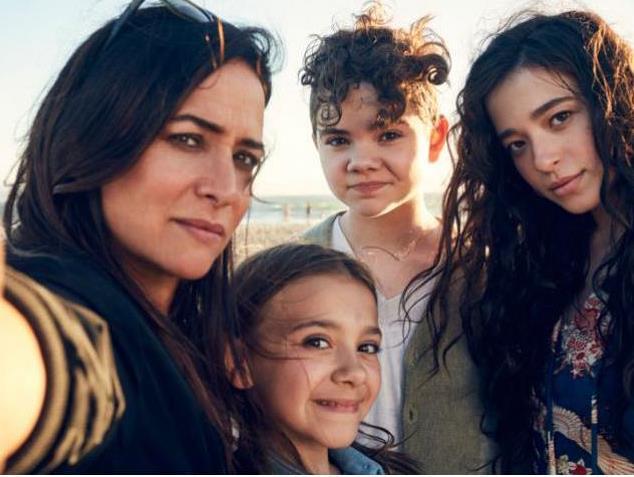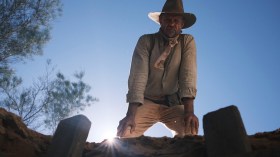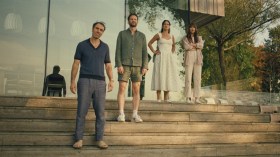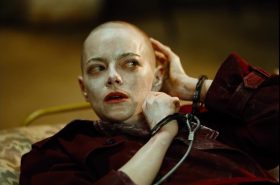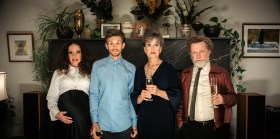Image: Better Things, Season 3. Source: FX.
I’ll admit, I was worried when Pamela Adlon, the creator and star of Better Things, declared that, in its third season (recently concluded), there would be a definite “arc” to her character of Sam, and perhaps several other central figures in the series. In screenwriting lingo, an arc refers to a goal or an outcome. In the epic terms of Game of Thrones and its ilk, it can refer to destiny or fate. In any story, and in any genre, it should, at the very least, carry the orienting sense that the narrative is clearly “heading somewhere”.
But the best thing about the first two seasons of Better Things is that it had virtually no discernible story arc! Life basically bumbles along for Sam and her three daughters: in descending order of age, Max (Mikey Madison), Frankie (Hannah Alligood) and Duke (Olivia Edward). There are, more or less, certain areas of intrigue. Sam’s mother, Phyllis (Celia Imrie), shows signs of galloping dementia. Various men, potential or fleeting love and/or sex interests for Sam, come and go. Her career as an actor, likewise, is an on/off affair. Something dramatic flagged at the end of season 1 – Max yelling at her mother that Frankie is “really a boy” – was not followed up (explicitly, at any rate) in the 10 episodes of season 2.
As it turns out, I didn’t need to fret. What has loomed as one of the biggest “hooks” of season 3 – the mutual attraction between Sam and talent manager Mer (Marsha Thomason), known as a famous “flipper” of straight ladies – has not yet played itself out. Sam’s mounting anxiety about the approach of menopause has mainly led, for the time being, to an affair with her therapist (who is also the guy who had a crush on her back in school), David (Matthew Broderick). Mother-daughter issues involving Max have become less intense (she has moved back home), while those concerning Frankie are more intense (the season 3 finale focused on the teen’s self-admitted “asshole” behaviour). We keep expecting terrible, traumatic things to happen, but they never do. At one point (episode 6), Phyllis’ fogginess led to the potentially tragic result knocking over the skateboarding Duke while driving her car – but there was no great consequence of that. In fact, on the scale of dramatic excitement, perhaps the most momentous leitmotiv of this season has been the domestic purchase of a super-flushing toilet (leading to a magnificent gag pay-off in episode 10). Although a pet mouse may meet its demise, the humans in this series – so far, at any rate – evince an almost miraculous ability to recover from wear and tear, and keep going.
Better Things remains the utterly lovable show it has been from the very first episode in 2016. In fact, for faithful fans (such as myself), it only becomes more lovable with each passing year. For a series that is, on some levels, decidedly tough and anti-sentimental (Sam’s hardboiled, one-liner putdowns are indelible), it can sure incite a flood of tears at highpoints of emotion – like the films of James L. Brooks, it looks hard for redemptive (or just plain relieving) moments of human bonding amid the frequently depressing hard-knocks of daily life. Those moments, the “better things” flagged in the title, usually involve Sam and one or all of her daughters, but also extend to Adlon’s depiction of Sam’s friendships – with other women, and also with her gay soulmate, Rich (Diedrich Bader).
It has become increasingly rare in contemporary TV productions to feel, as a viewer, that all the proportions are right – that the length of episodes, the number of episodes per season, and the years spent churning out seasons, truly fit the scale, temperament and meaning-potential of the fictional world and its characters. Better Things approaches perfection in this realm; its format (roughly 30-minute episodes) feels neither constrictive nor unduly repetitive, and nothing that occurs (often surprisingly) is lingered on past its optimum moment of comic or dramatic tension. Most impressively, its episodes are essentially self-contained – there is never a concluding, suspenseful question-mark to be answered or resolved in the following week’s story-line – without ever succumbing to overly packaged, situation-comedy neatness.
After directing only two episodes of the first season, Adlon has taken the reins for every instalment since. On that level, she has become the master of her own domain; she’s steadily become one of the best directors currently working in the medium of TV. For example: the home-space of Sam’s family has become a place we know in all its diverse aspects and moods, from every possible angle. The kitchen is (sometimes by default, as it’s the only point where everyone gathers) the central locus for conversation, confrontation and community. Here, Sam gets to play her almost mythic role as “den mother” to an extended family (everybody’s friends included), even to the point of a certain, wish-fulfilment unreality: we wonder how somebody like her, with a forever on-call career in the media, really manages to hold this clan together as well as she does, and Adlon intends for us to wonder (as well as frequently reminding us how utterly stressed-out Sam is in her multi-tasked existence).
These dual elements of fantasy and doubt are crucial to Better Things. A key feature of season 3 is the steady increase of “visions” of various kinds – apparitions (such as a large, dangerous bear in the driveway) that may be either real or imagined, but matter just as much either way. These elements of surreal “excess” shake up the series and recharge it, taking it to a higher plane. The single finest example was the finale of season 2 where Adlon set up a stunning dance number involving herself, Frankie, Duke and Phyllis (to the beat of “Tilted” by Christine and the Queens, just one instance of the show’s ever-surprising music choices) – and managed to keep it a secret from Max/Madison, leading her to it, untying her blindfold and then recording the real reaction of both character and actor simultaneously. It was a sublime TV moment – and, quite by coincidence, uncannily like some of the apparitions staged by Australian director Angie Black for her independent feature, The Five Provocations (2018).
The most frequent apparition in season 3 has been that of Sam’s comedian father, Murray (Adam Kulbersh). He shuffled off this mortal coil some time ago, but now pops up everywhere as a seemingly solid spectre – whether sitting in a chair and silently listening to events (such as his own memorial), offering advice to Sam from the back seat of her car about her love life, or bonding with the impressionable (and easily freaked-out) Duke. The very moving penultimate episode of season 2, set (for a change) not at home or on a movie shoot but in the natural setting of White Rock in British Columbia, anticipated this move into an other-worldly (but still perfectly quotidian) realm.
Although I would never to be so bold as to suggest this to Adlon’s face, I cannot help but think that, at one level, the figure of Murray is a coded allusion to that other comedic spectre whose name (it seems) cannot be uttered in some of her press interviews – namely, Louis C.K.. Since the revelations in 2017 of his odious “sexual misconduct”, he has been persona non grata in American showbiz. While still retaining a credit as co-creator (with Adlon) of Better Things’ characters, his tie with the series has otherwise been cut. Yet it would be a shame to erase the fact that what Adlon is now achieving has at least some of its roots in the most adventurous aspects of Louie (2010-2015) on which both she and Louis C.K. worked, as well as his stunning web series “tragedy” Horace and Pete (2016), and even his more-denigrated-than-seen feature (in which Adlon has a role), I Love You, Daddy (2017). Adlon is doing her own thing – no doubt about that – but she’s also part of a loose contemporary “family” of genre-destabilising artists of which we shouldn’t lose sight.
The final series of Louie in 2015 occasionally launched into dreamlike fantasias that leaned toward David Lynch-style gothic horror. Adlon takes the “life is a dream” flux of her ongoing narrative in an altogether different direction – more benign and less tortured, while never losing sight of daily difficulties. Memories (and ghosts) of the past mingle with the unpredictable encounters and experiences of the present; dreams and reveries help disentangle each person’s confusions and mistakes. Season 4 is slated for 2020. So where is Better Things going next? I wouldn’t have a clue, and I’m entirely happy about that.
|
5 stars
|
★★★★★
|
© Adrian Martin, May 2019
Actors:
Director:
Format:
Country:
Release:
